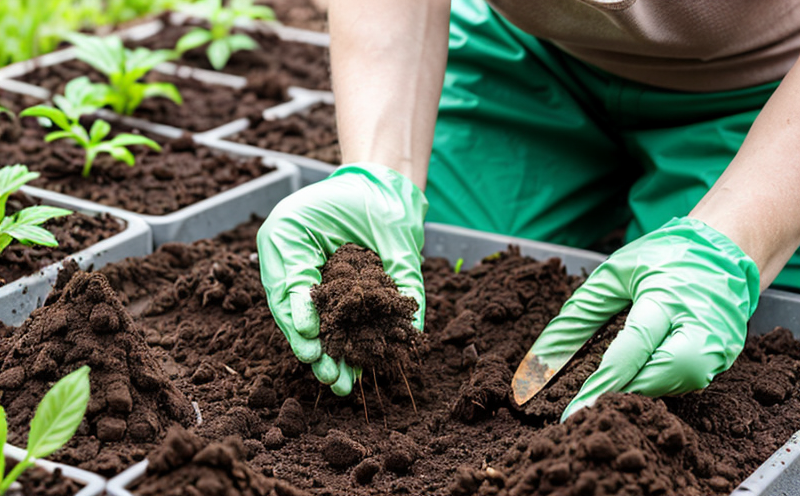UNE EN ISO 16495 Compatibility Testing of Plastic Gardening Containers
The UNE EN ISO 16495 standard is a critical tool in ensuring the compatibility and durability of plastic containers used in gardening. This test evaluates whether materials interact harmfully with soil, water, or other elements encountered in outdoor environments. The standard addresses potential issues such as leaching of harmful substances into the environment, which can affect plant growth, soil quality, and ultimately impact human health.
Plastic containers are widely used for growing plants due to their lightweight nature, cost-effectiveness, and ease of use. However, the materials from which they are made must not pose risks when exposed to environmental elements like sunlight, water, or soil. UNE EN ISO 16495 ensures that any plastic container intended for direct contact with these elements is safe and reliable.
The testing procedure involves submerging the container in a specific solution designed to simulate real-world conditions. The material inside the container interacts with this solution over time, after which the container is analyzed for potential leaching of chemicals or other harmful materials into the surrounding environment. Compliance ensures that gardeners can use these containers without fear of contamination.
This test is particularly important in sectors where environmental and health safety are paramount. For instance, in agriculture, horticulture, and landscaping, the use of compatible plastic containers can prevent soil and water pollution, ensuring a cleaner ecosystem. This standard is not only beneficial for businesses but also for consumers who want to ensure they are using safe products.
The UNE EN ISO 16495 compatibility test is part of a broader suite of standards that ensures the integrity of plastic materials used in various applications. It aligns with other international standards such as ASTM D876, which covers similar testing for soil contact containers, and IEC 62321 for packaging materials.
The rigorous nature of UNE EN ISO 16495 ensures that only the most reliable plastic containers are used in gardening. This reliability is crucial not only for the plants but also for the environment as a whole. By adhering to this standard, manufacturers and suppliers can ensure their products meet the highest quality standards, thereby gaining consumer trust.
The test process typically involves several steps:
- Submerging the container in a solution designed to simulate real-world conditions.
- Monitoring the interaction between the material and the solution over time.
- Analyzing the container for any signs of harmful leaching or degradation.
The UNE EN ISO 16495 standard is widely recognized across Europe and beyond. It has been adopted by numerous countries as a way to ensure product safety and environmental responsibility. This widespread acceptance underscores its importance in maintaining high standards of quality and reliability.
Benefits
The benefits of undergoing UNE EN ISO 16495 compatibility testing are manifold. Firstly, it enhances the reputation of businesses by demonstrating a commitment to environmental responsibility and product safety. Consumers trust brands that adhere to international standards, which can lead to increased sales and customer loyalty.
Secondly, compliance with this standard ensures that products meet regulatory requirements, thereby avoiding costly legal issues or recalls. This not only protects the brand’s reputation but also saves resources in the long run by preventing any potential damage caused by non-compliant products.
Thirdly, UNE EN ISO 16495 compatibility testing provides a competitive edge in an increasingly regulated market. By ensuring that products meet or exceed these standards, businesses can differentiate themselves from competitors and position themselves as leaders in environmental responsibility.
In summary, undergoing this test not only ensures product safety but also fosters trust with customers and regulatory bodies. It is an investment in the future of your business by promoting sustainable practices and maintaining high-quality standards.
Why Choose This Test
Selecting UNE EN ISO 16495 compatibility testing for plastic gardening containers is a strategic decision that aligns with global trends towards sustainability and environmental responsibility. The test ensures that materials used in these containers do not pose risks to the environment or human health, making it an essential step in product development.
The UNE EN ISO 16495 standard provides a robust framework for evaluating the compatibility of plastic materials intended for direct contact with soil and water. This comprehensive approach helps manufacturers identify potential issues early in the design process, allowing for necessary adjustments to be made before production begins. By doing so, it reduces the likelihood of costly rework or product recalls.
The test also offers a clear path for regulatory compliance, ensuring that products meet legal requirements across different regions. This is particularly important given the increasing global focus on environmental protection and sustainable practices. Adherence to these standards can help businesses navigate complex regulations with ease, avoiding unnecessary delays or penalties.
In addition to its practical benefits, undergoing this test can significantly enhance a company's reputation among consumers who are increasingly conscious of their purchasing decisions' environmental impact. By demonstrating a commitment to sustainability, companies can build strong relationships with environmentally-conscious customers, leading to increased brand loyalty and positive word-of-mouth marketing.
International Acceptance and Recognition
- The UNE EN ISO 16495 standard is widely recognized across Europe and beyond, ensuring that products meet stringent quality and safety standards.
- Mandated in several countries, it provides a common framework for evaluating plastic containers used in gardening applications.
- Adoption by international organizations underscores its importance in promoting sustainable practices globally.
The standard has been adopted by numerous countries as part of their regulatory frameworks. This widespread acceptance reflects the growing global consensus on the need for stringent environmental and safety standards in product design and manufacturing.
The UNE EN ISO 16495 compatibility test is an essential step in ensuring that plastic containers used in gardening are safe, reliable, and environmentally responsible. By adhering to this standard, businesses can demonstrate their commitment to sustainability and regulatory compliance, thereby gaining a competitive edge in the market.





